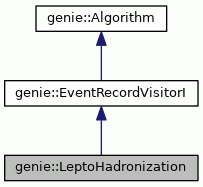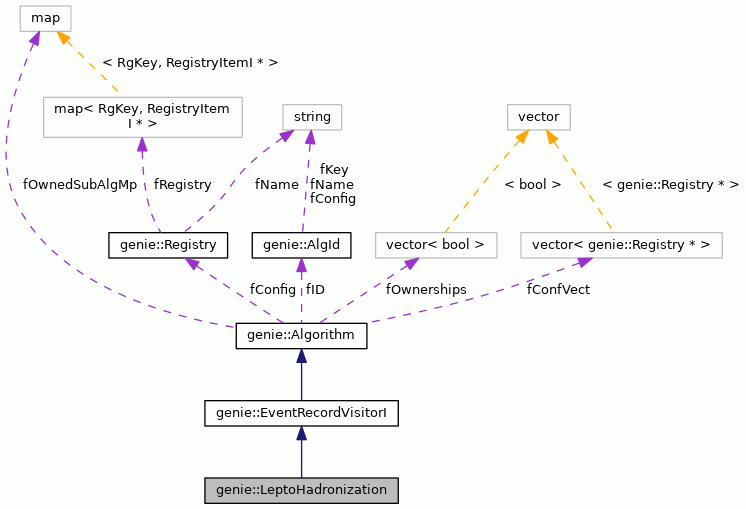|
GENIEGenerator
|
|
GENIEGenerator
|
Provides access to the LEPTO hadronization models.
.
More...
#include <LeptoHadronization.h>


Public Member Functions | |
| LeptoHadronization () | |
| LeptoHadronization (string config) | |
| virtual | ~LeptoHadronization () |
| void | ProcessEventRecord (GHepRecord *event) const |
| void | Configure (const Registry &config) |
| void | Configure (string config) |
 Public Member Functions inherited from genie::EventRecordVisitorI Public Member Functions inherited from genie::EventRecordVisitorI | |
| virtual | ~EventRecordVisitorI () |
 Public Member Functions inherited from genie::Algorithm Public Member Functions inherited from genie::Algorithm | |
| virtual | ~Algorithm () |
| virtual void | FindConfig (void) |
| virtual const Registry & | GetConfig (void) const |
| Registry * | GetOwnedConfig (void) |
| virtual const AlgId & | Id (void) const |
| Get algorithm ID. More... | |
| virtual AlgStatus_t | GetStatus (void) const |
| Get algorithm status. More... | |
| virtual bool | AllowReconfig (void) const |
| virtual AlgCmp_t | Compare (const Algorithm *alg) const |
| Compare with input algorithm. More... | |
| virtual void | SetId (const AlgId &id) |
| Set algorithm ID. More... | |
| virtual void | SetId (string name, string config) |
| const Algorithm * | SubAlg (const RgKey ®istry_key) const |
| void | AdoptConfig (void) |
| void | AdoptSubstructure (void) |
| virtual void | Print (ostream &stream) const |
| Print algorithm info. More... | |
Private Member Functions | |
| bool | Hadronize (GHepRecord *event) const |
| void | Initialize (void) const |
| void | LoadConfig (void) |
Private Attributes | |
| TPythia6 * | fPythia |
| PYTHIA6 wrapper class. More... | |
| int | fMaxIterHad |
| double | fPrimordialKT |
| double | fRemnantPT |
| double | fMinESinglet |
| bool | fPromptPythiaList |
| double | fWmin |
Additional Inherited Members | |
 Static Public Member Functions inherited from genie::Algorithm Static Public Member Functions inherited from genie::Algorithm | |
| static string | BuildParamVectKey (const std::string &comm_name, unsigned int i) |
| static string | BuildParamVectSizeKey (const std::string &comm_name) |
| static string | BuildParamMatKey (const std::string &comm_name, unsigned int i, unsigned int j) |
| static string | BuildParamMatRowSizeKey (const std::string &comm_name) |
| static string | BuildParamMatColSizeKey (const std::string &comm_name) |
 Protected Member Functions inherited from genie::EventRecordVisitorI Protected Member Functions inherited from genie::EventRecordVisitorI | |
| EventRecordVisitorI () | |
| EventRecordVisitorI (string name) | |
| EventRecordVisitorI (string name, string config) | |
 Protected Member Functions inherited from genie::Algorithm Protected Member Functions inherited from genie::Algorithm | |
| Algorithm () | |
| Algorithm (string name) | |
| Algorithm (string name, string config) | |
| void | Initialize (void) |
| void | DeleteConfig (void) |
| void | DeleteSubstructure (void) |
| Registry * | ExtractLocalConfig (const Registry &in) const |
| Registry * | ExtractLowerConfig (const Registry &in, const string &alg_key) const |
| Split an incoming configuration Registry into a block valid for the sub-algo identified by alg_key. More... | |
| template<class T > | |
| bool | GetParam (const RgKey &name, T &p, bool is_top_call=true) const |
| template<class T > | |
| bool | GetParamDef (const RgKey &name, T &p, const T &def) const |
| template<class T > | |
| int | GetParamVect (const std::string &comm_name, std::vector< T > &v, bool is_top_call=true) const |
| Handle to load vectors of parameters. More... | |
| int | GetParamVectKeys (const std::string &comm_name, std::vector< RgKey > &k, bool is_top_call=true) const |
| template<class T > | |
| int | GetParamMat (const std::string &comm_name, TMatrixT< T > &mat, bool is_top_call=true) const |
| Handle to load matrix of parameters. More... | |
| template<class T > | |
| int | GetParamMatSym (const std::string &comm_name, TMatrixTSym< T > &mat, bool is_top_call=true) const |
| int | GetParamMatKeys (const std::string &comm_name, std::vector< RgKey > &k, bool is_top_call=true) const |
| int | AddTopRegistry (Registry *rp, bool owns=true) |
| add registry with top priority, also update ownership More... | |
| int | AddLowRegistry (Registry *rp, bool owns=true) |
| add registry with lowest priority, also update ownership More... | |
| int | MergeTopRegistry (const Registry &r) |
| int | AddTopRegisties (const vector< Registry * > &rs, bool owns=false) |
| Add registries with top priority, also udated Ownerships. More... | |
 Protected Attributes inherited from genie::Algorithm Protected Attributes inherited from genie::Algorithm | |
| bool | fAllowReconfig |
| bool | fOwnsSubstruc |
| true if it owns its substructure (sub-algs,...) More... | |
| AlgId | fID |
| algorithm name and configuration set More... | |
| vector< Registry * > | fConfVect |
| vector< bool > | fOwnerships |
| ownership for every registry in fConfVect More... | |
| AlgStatus_t | fStatus |
| algorithm execution status More... | |
| AlgMap * | fOwnedSubAlgMp |
| local pool for owned sub-algs (taken out of the factory pool) More... | |
Provides access to the LEPTO hadronization models.
.
Definition at line 38 of file LeptoHadronization.h.
| LeptoHadronization::LeptoHadronization | ( | ) |
Definition at line 52 of file LeptoHadronization.cxx.
References Initialize().
| LeptoHadronization::LeptoHadronization | ( | string | config | ) |
Definition at line 58 of file LeptoHadronization.cxx.
References Initialize().
|
virtual |
Definition at line 64 of file LeptoHadronization.cxx.
|
virtual |
Configure the algorithm with an external registry The registry is merged with the top level registry if it is owned, Otherwise a copy of it is added with the highest priority
Reimplemented from genie::Algorithm.
Definition at line 479 of file LeptoHadronization.cxx.
References genie::Algorithm::Configure(), and LoadConfig().
|
virtual |
Configure the algorithm from the AlgoConfigPool based on param_set string given in input An algorithm contains a vector of registries coming from different xml configuration files, which are loaded according a very precise prioriy This methods will load a number registries in order of priority: 1) "Tunable" parameter set from CommonParametes. This is loaded with the highest prioriry and it is designed to be used for tuning procedure Usage not expected from the user. 2) For every string defined in "CommonParame" the corresponding parameter set will be loaded from CommonParameter.xml 3) parameter set specified by the config string and defined in the xml file of the algorithm 4) if config is not "Default" also the Default parameter set from the same xml file will be loaded Effectively this avoids the repetion of a parameter when it is not changed in the requested configuration
Reimplemented from genie::Algorithm.
Definition at line 485 of file LeptoHadronization.cxx.
References genie::Algorithm::Configure(), and LoadConfig().
|
private |
Definition at line 107 of file LeptoHadronization.cxx.
References genie::utils::math::LongLorentzVector::BoostZ(), genie::Interaction::ExclTag(), genie::XclsTag::FinalQuarkPdg(), genie::PDGLibrary::Find(), fMaxIterHad, fMinESinglet, fPrimordialKT, fPythia, fRemnantPT, fWmin, genie::Target::HitNucPdg(), genie::Target::HitQrkIsSet(), genie::Target::HitQrkPdg(), genie::Interaction::InitState(), genie::RandomGen::Instance(), genie::PDGLibrary::Instance(), genie::pdg::IsDiQuark(), genie::pdg::IsDQuark(), genie::pdg::IsProton(), genie::pdg::IsQuark(), genie::pdg::IsTQuark(), genie::pdg::IsUQuark(), genie::Interaction::Kine(), genie::Interaction::KinePtr(), genie::kIStDISPreFragmHadronicState, genie::kIStStableFinalState, genie::constants::kMw, genie::kPdgDDDiquarkS1, genie::kPdgHadronicSyst, genie::kPdgUDDiquarkS0, genie::kPdgUDDiquarkS1, genie::kPdgUUDiquarkS1, genie::constants::kPi, LOG, genie::units::millimeter, pDEBUG, pERROR, pINFO, pWARN, pyangl_(), pydecy_(), pykfdi_(), pyrobo_(), pyzdis_(), genie::RandomGen::RndHadro(), genie::units::second, genie::Kinematics::SetHadSystP4(), genie::Kinematics::SetW(), genie::InitialState::Tgt(), genie::Kinematics::W(), and genie::utils::kinematics::W().
Referenced by ProcessEventRecord().
|
private |
Definition at line 69 of file LeptoHadronization.cxx.
References fPythia, and genie::RandomGen::Instance().
Referenced by LeptoHadronization().
|
private |
Definition at line 491 of file LeptoHadronization.cxx.
References fMaxIterHad, fMinESinglet, fPrimordialKT, fPythia, fRemnantPT, fWmin, genie::Algorithm::GetParam(), and genie::constants::kMw.
Referenced by Configure().
|
virtual |
Implements genie::EventRecordVisitorI.
Definition at line 79 of file LeptoHadronization.cxx.
References genie::gAbortingInErr, Hadronize(), genie::kHadroSysGenErr, LOG, pFATAL, pWARN, genie::exceptions::EVGThreadException::SetReason(), and genie::exceptions::EVGThreadException::SwitchOnFastForward().
|
private |
Definition at line 65 of file LeptoHadronization.h.
Referenced by Hadronize(), and LoadConfig().
|
private |
Definition at line 68 of file LeptoHadronization.h.
Referenced by Hadronize(), and LoadConfig().
|
private |
Definition at line 66 of file LeptoHadronization.h.
Referenced by Hadronize(), and LoadConfig().
|
private |
Definition at line 69 of file LeptoHadronization.h.
|
mutableprivate |
PYTHIA6 wrapper class.
Definition at line 61 of file LeptoHadronization.h.
Referenced by Hadronize(), Initialize(), and LoadConfig().
|
private |
Definition at line 67 of file LeptoHadronization.h.
Referenced by Hadronize(), and LoadConfig().
|
private |
Definition at line 70 of file LeptoHadronization.h.
Referenced by Hadronize(), and LoadConfig().
 1.8.5
1.8.5